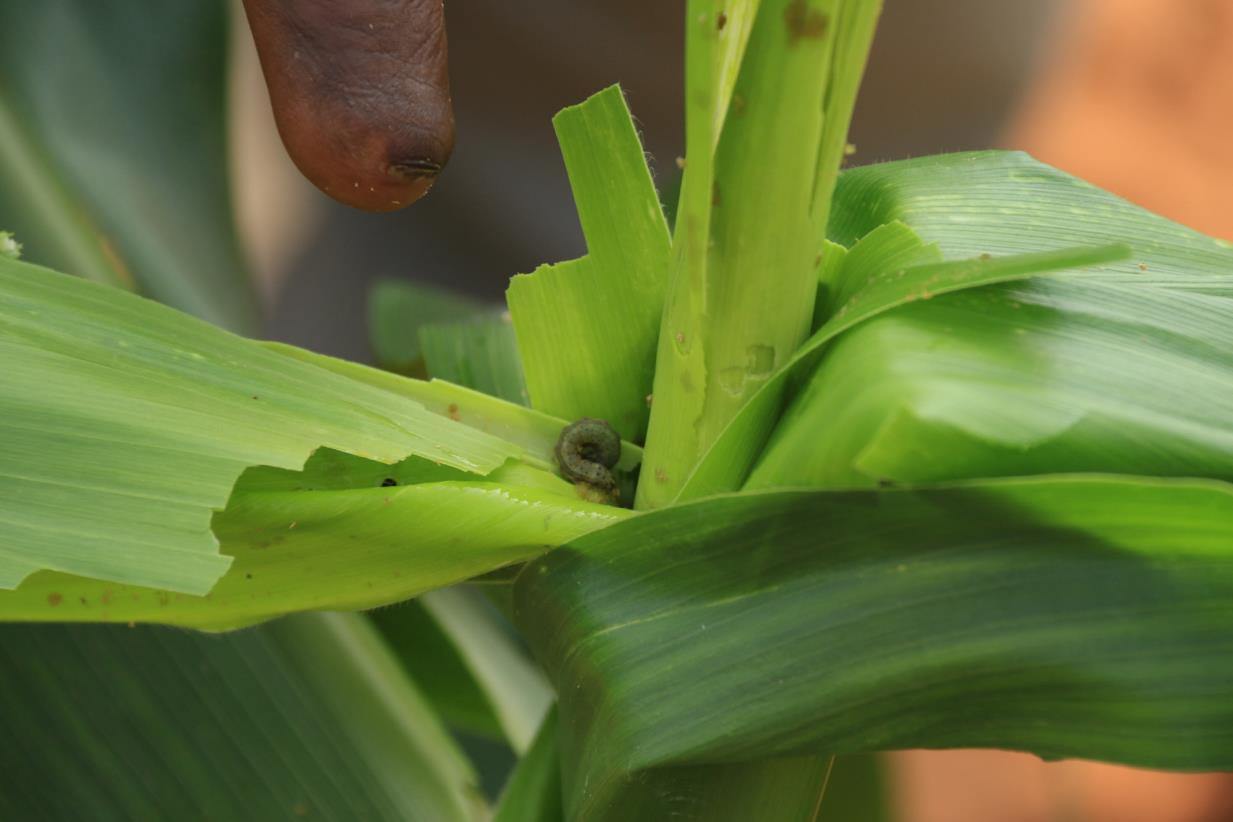Urgent need to step up efforts to fight fast-spreading pests and diseases
Three major animal and plant pests and diseases put global food security at risk

A fall armyworm inside a maize stem.
©Photo: ©FAO/Rachel Nandelenga
30 November 2017, Rome – There is an urgent need to step up collective efforts to fight fast-spreading, cross-border animal and plant pests and diseases that could threaten global food security.
This was the core message of representatives of more than 20 countries, assessing the impact of three major pests and diseases. The meeting was organized by FAO, World Organisation for Animal Health (OIE), Bioversity International, World Banana Forum and donors to mobilize more support to effectively and sustainably prevent, manage, and – if feasible - eradicate the major pests and diseases.
Fall Armyworm (FAW), Peste des petits ruminants (PPR) also called Sheep and Goat Plague, and Banana Fusarium Wilt (FW) are rapidly-spreading, cross-border animal and plant pests and diseases that put the food security and livelihoods of millions of smallholder farmers at risk; stymie the economic prospects of entire countries and regions; and have the potential to spread to new areas.
"Invasive pests and diseases are the second most important threat to nature due to their severe impact on populations’ livelihoods; on the health of people, animal and plants; and on the economy. They are affecting those most vulnerable – the poorest farmers, and can ultimately threaten food security on a global scale,” said Ren Wang, Assistant Director-General, Agriculture and Consumer Protection Department of FAO.
"Outbreaks of cross-border animal and plant pests and diseases have been on the rise over the past years. This is due to a range of interlinked factors, including global trade and climate change. Complex issues need complex and timely solutions,” added Wang.
The event paved the way for a more robust and targeted commitment from major resource partners to address the three pests and diseases, with fully-fledged donor meetings to take place early next year.
The three major animal and plant pests and diseases up-close
Fall Armyworm is an insect native to tropical and sub-tropical America. It arrived in Africa in early 2016, and has since spread across all of Sub-Saharan Africa, with North Africa now also at risk.
It can feed on over 80 crops, but it is affecting most strongly smallholder maize farmers with no experience of the pest, and few resources to manage it.
If left unchecked, FAW could significantly impact the primary food source of more than 200 million people in Sub-Saharan Africa, and lead to annual economic losses of up to $4.8 billion from maize production alone.
Peste des petits ruminants is a fast-spreading viral disease that affects and kills up to 90 percent of the infected small ruminants (sheep and goats). It was first reported in Ivory Coast in 1942. Since then, it has spread at an alarming rate to over 70 countries in Africa, the Middle East, Europe and Asia.
Today, over 80 percent of the world’s sheep and goat populations are at risk. PPR causes annual economic losses of up to $2.1 billion, and is severely impacting 300 million poor households and their communities as they depend on the animals for their very survival.
Banana Fusarium Wilt is one of the most destructive banana diseases worldwide. Its new race - Tropical Race 4 (TR4) - has been causing serious losses in Southeast Asia, leading to thousands of hectares of abandoned land.
It has recently spread to the Middle East, Mozambique, and South Asia and is likely to spread further.
Banana, together with plantains, is the most exported fruit in the world and the most produced food crop in least-developed countries. Some 400 million people rely on banana as staple food and source of income.
FW can cause 100 percent yield loss in infested fields, jeopardizing the food security and livelihoods of rural communities, and the banana value chain.
FAO’s fight against FAW, PPR and FW
FAO has recently developed a five-year programme to support farmers and governments sustainably manage FAW in Africa. For its implementation, FAO urgently requires $87 million.
FAO has just launched a five-year global programme to prevent and manage FW Disease, in partnership with Bioversity International, International Institute of Tropical Agriculture and World Banana Forum, requiring $98 million.
To eradicate PPR, FAO and OIE launched a five-year global programme last October.
Contact
FAO News and Media (+39) 06 570 53625 [email protected]
